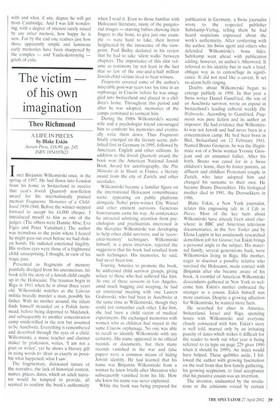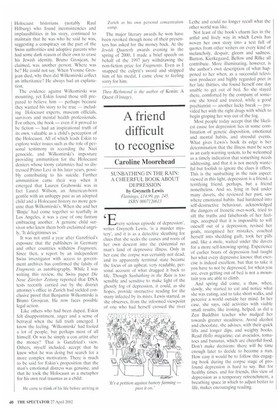The victim of his own imagination
Theo Richmond
A LIFE IN PIECES by Blake Eskin AI1111111 Press, £16.99, pp. 245, ISBN 1854107623 Imet Binjamin Wilkomirski once, in the spring of 1997. He had flown into London from his home in Switzerland to receive that year's Jewish Quarterly non-fiction award for his internationally praised memoir Fragments: Memories of a Childhood 1939-1948. Before the winner stepped forward to accept his /4.000 cheque, I introduced myself to him as one of the judges. (The others were Dannie Abse, Eva Figes and Peter Vansittart.) The author was tremulous to the point where I feared he might pass out even before we had shaken hands. He radiated emotional fragility. His restless eyes were those of a frightened child: unsurprising. I thought, in view of his tragic past.
Presented as fragments of memory painfully dredged from his unconscious, his hook tells the story of a Jewish child caught up in the Holocaust. The traumas begin in Riga in 1941 when he is about three years old. Wilkomirski watches as the Latvian militia brutally murder a man, possibly his father. With no mother around, the infant finds himself stranded on a Polish farmstead, before being deported to Majdanek, and subsequently to another concentration camp unidentified in the text but assumed to be Auschwitz. Everything is remembered and described through the eyes of a child. Wilkomirski, a music teacher and clarinet maker by profession, writes, 'I am not a poet or writer', yet he shows a literary gift in using words to 'draw as exactly as possible what happened, what I saw'.
The fragmentary, dislocated nature of the narrative, the lack of historical context, names, places, dates, which an adult narrator would be tempted to provide, all seemed to confirm the book's authenticity when I read it. Even to those familiar with Holocaust literature, many of the purgatorial images — starving babies chewing their fingers to the bone, to give just one example — were hard to take, their horror heightened by the innocence of the viewpoint. Paul Bailey declared in his review that he had to take 'silent walks' between chapters. The importance of this slim volume as testimony lay not least in the fact that so few of the one-and-a-half million Jewish child victims lived to bear witness.
Fragments covered some of the author's miserable post-war years too: his time in an orphanage in Cracow before he was smuggled into Switzerland and placed in a children's home. Throughout this period and after he was adopted, memories of the camps continued to torment him.
During the 1980s Wilkomirski's second wife and a psychologist friend encouraged him to confront his memories and eventually write them down. Thus Fragments finally emerged on the literary scene, published first in Germany in 1995, followed by American, English and other editions. In addition to the Jewish Quarterly award, the book won the American National Jewish Book Award for autobiography, the Prix Memoire de la Shoah in France, a literary award from the city of Zurich. and other accolades.
Wilkomirski became a familiar figure on the international Holocaust remembrance scene. appearing on public platforms alongside Nobel prize-winner Elie Wiesel and other eminent survivors. Generous honorariums came his way. At conferences he attracted admiring attention from psychologists and psychiatrists interested in the therapies Wilkomirski was developing to help other child survivors, and in 'recovered-me meg' techniques. Wilkomirski himself, in a press interview, rejected the suggestion that his book had resulted from such techniques. His memories, he said, had never been lost.
Touring America to promote the book, he addressed child survivor groups, giving solace to those who had suffered like him. At one of these sessions in Los Angeles, amid much hugging and weeping, he had an emotional meeting with one Lauren Grabowski. who had been in Auschwitz at the same time as Wilkomirski. though they could not remember each other. Like him, she had been a child victim of medical experiments. He exchanged memories with women who as children had stayed in the same Cracow orphanage. No one was able to recall or identify Wilkomirski with any certainty. His name appeared in no official records or documents, but then many records vanished in the war and false papers were a common means of hiding Jewish identity. He had learned that his name was Binjamin Wilkomirski from a woman he knew briefly after liberation who subsequently vanished from his life. How she knew his name was never explained.
While the book was being prepared for publication in Germany, a Swiss journalist wrote to the respected publisher Suhrkamp-Verlag, telling them he had heard suspicions expressed about the work's authenticity. After conferring with the author, his Swiss agent and others who defended Wilkomirski's bona fides, Suhrkamp went ahead with publication adding, however, an author's Afterword. It referred to his identity but in such a brief, oblique way as to camouflage its significance. It did not read like a caveat. It set no alarm bells ringing.
Doubts about Wilkomirski began to emerge publicly in 1998. In that year a Swiss writer Daniel Ganzfried, the son of an Auschwitz survivor, wrote an exposé in Switzerland's leading cultural weekly Die Weltwoche. According to Ganzfried, Fragments was pure fiction and its author an impostor. He had evidence that Wilkomirski was not Jewish and had never been in a concentration camp. He had been born in Biel. Switzerland on 12 February 1941. Named Bruno Grosjean, he was the illegitimate son of a Swiss woman Yvonne Grosjean and an unnamed father. After his birth. Bruno was cared for in a Swiss children's home, then by foster parents, an affluent and childless Protestant couple in Zurich, who later adopted him and changed his surname to their own. He became Bruno Doessekker, His biological mother died in 1981, the Doessekkers in 1986.
Blake Eskin, a New York journalist, relates this engrossing tale in A Life in Pieces. Most of the key facts about Wilkomirski have already been aired elsewhere: in BBC and American television documentaries, in the New Yorker and by Elena Lappin in her assiduously researched demolition job for Granta; but Eskin brings a personal angle to the subject. His maternal family, several generations back, were Wilkomirskis living in Riga. His mother, eager to discover a possible relative who survived the Holocaust, made contact with Binjamin after she became aware of his book. A roomful of American Wilkomirski descendants gathered in New York to welcome him. Eskin's mother embraced the stranger as a cousin. Eskin himself was more cautious. Despite a growing affection for Wilkomirski, he wanted more facts.
He searched for clues in America, Switzerland, Israel and Riga, spending hours with Wilkomirski and everyone closely connected with him. Eskin's story is well told, marred only by an irritating paucity of dates which makes it difficult for the reader to work out what year is being referred to (a typo on page 229 gives 1990 when it should be 1999). An index would have helped. These quibbles aside, I followed the author with growing fascination on the trail from that first family gathering, his growing scepticism, to final acceptance that his putative cousin was an invention.
The inventor, undaunted by the revelations or the criticisms voiced by certain Holocaust historians (notably Raul Hilburg) who found inconsistencies and implausibilities in his story, continued to maintain that he was who he said he was, suggesting a conspiracy on the part of the Swiss authorities and adoptive parents who had some dark reason of their own to erase his Jewish identity. Bruno Grosjean, he claimed, was another person. Where was he? He could not say. When Yvonne Grosjean died, why then did Wilkomirski collect an inheritance? He always had an explanation.
The evidence against Wilkomirski was mounting, yet Eskin found those still prepared to believe him — perhaps because they wanted his story to be true — including Holocaust experts, museum officials, survivors and mental health professionals. For others, the book — even if it proved to be fiction — had an inspirational truth of its own, valuable as a child's perception of the Holocaust. All of which leads Eskin to explore wider issues such as the role of personal testimony in recording the Nazi genocide, and Wilkomirski's imposture providing ammunition for the Holocaust deniers whose loony calumnies had so distressed Primo Levi in his later years, possibly contributing to his suicide. Further ammunition came their way when it emerged that Lauren Grabowski was in fact Laurel Willson, an American-born gentile with an unhappy past as an adopted child and a Holocaust history no more genuine than Wilkomirski's. When she and her 'Binjie' had come together so tearfully in Los Angeles, it was a case of one fantasy embracing another. A genuine child survivor who knew them both exclaimed angrily, 'It delegitimises us.'
It was not until a year after Ganzfried's exposure that the publishers in Germany and other countries withdrew Fragments. Since then, a report by an independent Swiss investigator with access to government archives has confirmed the falsity of Fragments as autobiography. While I was writing this review, the Swiss paper Die Neue Ziircher Zeitung reported that DNA tests recently carried out by the district attorney's office in Zurich had yielded conclusive proof that Benjamin Wilkomirski is Bruno Grosjean. He now faces possible legal action.
Like others who had been duped, Eskin felt disappointment, anger and a sense of betrayal when the full truth emerged. I know the feeling. 'Wilkomirski' had fooled a lot of people, but perhaps most of all himself. Or was he simply a con artist after the money? That is Ganzfried's view. Others, myself included, accept that he knew what he was doing but search for a more complex motivation. There is much to be said for Eskin's proposition that the man's emotional distress was genuine, and that he took the Holocaust as a metaphor for his own real traumas as a child:
He came to think of his life before arriving in Zurich as his own personal concentration camp.
The major literary awards he won have been revoked though none of their presenters has asked for the money back. At the Jewish Quarterly awards evening in the spring of 2000. I made a brief speech on behalf of the 1997 jury withdrawing the non-fiction prize for Fragments. Even as I snapped the culprit's sword and stripped him of his medal, I came close to feeling sorry for him.
Theo Richmond is the author of Konin: A Quest (Vintage).



































































 Previous page
Previous page